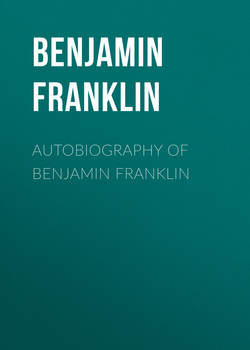Autobiography of Benjamin Franklin

Реклама. ООО «ЛитРес», ИНН: 7719571260.
Оглавление
Бенджамин Франклин. Autobiography of Benjamin Franklin
INTRODUCTION
I. ANCESTRY AND EARLY YOUTH IN BOSTON
II. BEGINNING LIFE AS A PRINTER
III. ARRIVAL IN PHILADELPHIA
IV. FIRST VISIT TO BOSTON
V. EARLY FRIENDS IN PHILADELPHIA
VI. FIRST VISIT TO LONDON
VII. BEGINNING BUSINESS IN PHILADELPHIA
VIII. BUSINESS SUCCESS AND FIRST PUBLIC SERVICE
IX. PLAN FOR ATTAINING MORAL PERFECTION
X. POOR RICHARD'S ALMANAC AND OTHER ACTIVITIES
XI. INTEREST IN PUBLIC AFFAIRS
XII. DEFENSE OF THE PROVINCE
XIII. PUBLIC SERVICES AND DUTIES (1749-1753)
XIV. ALBANY PLAN OF UNION
XV. QUARRELS WITH THE PROPRIETARY GOVERNORS
XVI. BRADDOCK'S EXPEDITION
XVII. FRANKLIN'S DEFENSE OF THE FRONTIER
XVIII. SCIENTIFIC EXPERIMENTS
XIX. AGENT OF PENNSYLVANIA IN LONDON
APPENDIX
ELECTRICAL KITE
THE WAY TO WEALTH
THE WHISTLE
A LETTER TO SAMUEL MATHER
BIBLIOGRAPHY
Отрывок из книги
WE Americans devour eagerly any piece of writing that purports to tell us the secret of success in life; yet how often we are disappointed to find nothing but commonplace statements, or receipts that we know by heart but never follow. Most of the life stories of our famous and successful men fail to inspire because they lack the human element that makes the record real and brings the story within our grasp. While we are searching far and near for some Aladdin's Lamp to give coveted fortune, there is ready at our hand if we will only reach out and take it, like the charm in Milton's Comus,
the interesting, human, and vividly told story of one of the wisest and most useful lives in our own history, and perhaps in any history. In Franklin's Autobiography is offered not so much a ready-made formula for success, as the companionship of a real flesh and blood man of extraordinary mind and quality, whose daily walk and conversation will help us to meet our own difficulties, much as does the example of a wise and strong friend. While we are fascinated by the story, we absorb the human experience through which a strong and helpful character is building.
.....
English literature of the eighteenth century was characterized by the development of prose. Periodical literature reached its perfection early in the century in The Tatler and The Spectator of Addison and Steele. Pamphleteers flourished throughout the period. The homelier prose of Bunyan and Defoe gradually gave place to the more elegant and artificial language of Samuel Johnson, who set the standard for prose writing from 1745 onward. This century saw the beginnings of the modern novel, in Fielding's Tom Jones, Richardson's Clarissa Harlowe, Sterne's Tristram Shandy, and Goldsmith's Vicar of Wakefield. Gibbon wrote The Decline and Fall of the Roman Empire, Hume his History of England, and Adam Smith the Wealth of Nations.
In the simplicity and vigor of his style Franklin more nearly resembles the earlier group of writers. In his first essays he was not an inferior imitator of Addison. In his numerous parables, moral allegories, and apologues he showed Bunyan's influence. But Franklin was essentially a journalist. In his swift, terse style, he is most like Defoe, who was the first great English journalist and master of the newspaper narrative. The style of both writers is marked by homely, vigorous expression, satire, burlesque, repartee. Here the comparison must end. Defoe and his contemporaries were authors. Their vocation was writing and their success rests on the imaginative or creative power they displayed. To authorship Franklin laid no claim. He wrote no work of the imagination. He developed only incidentally a style in many respects as remarkable as that of his English contemporaries. He wrote the best autobiography in existence, one of the most widely known collections of maxims, and an unsurpassed series of political and social satires, because he was a man of unusual scope of power and usefulness, who knew how to tell his fellow-men the secrets of that power and that usefulness.
.....